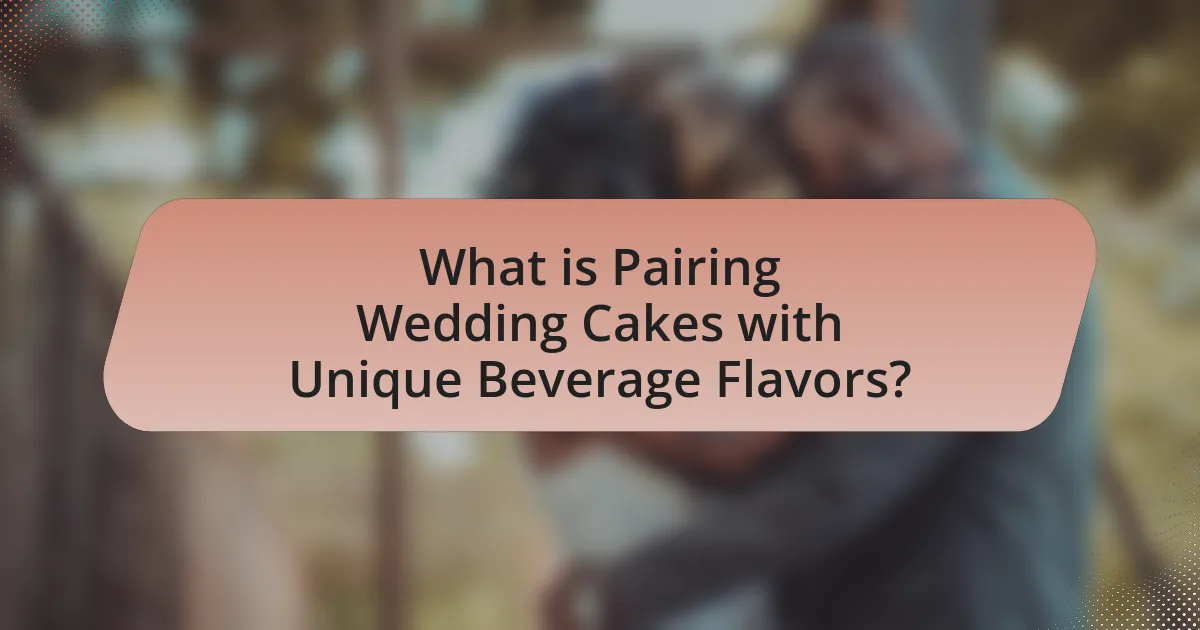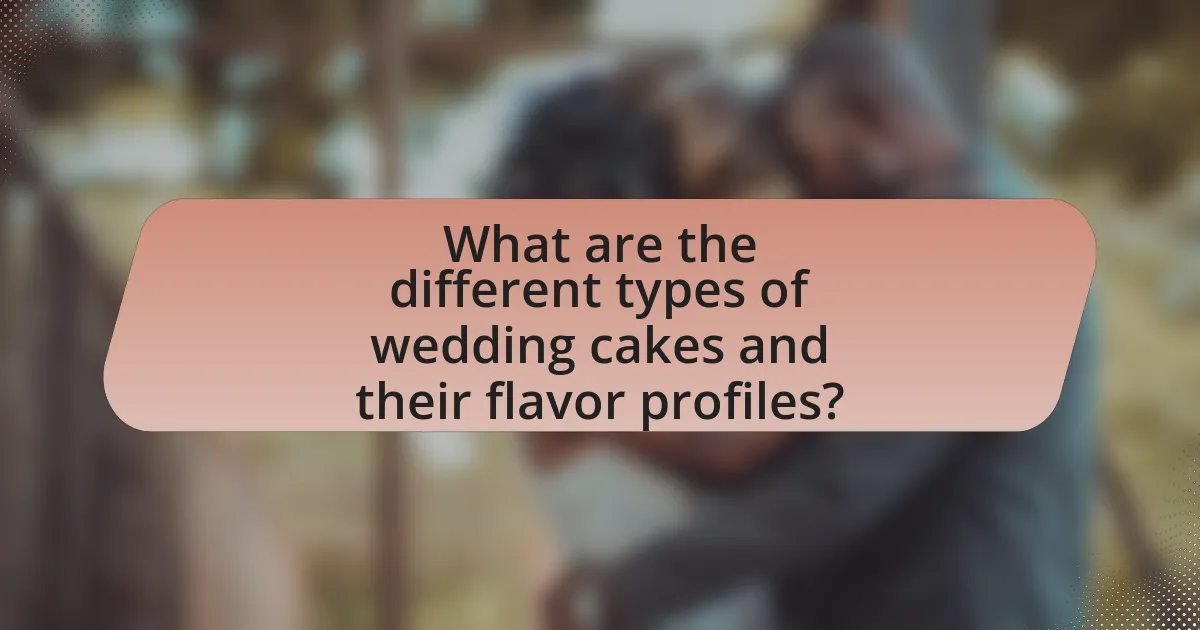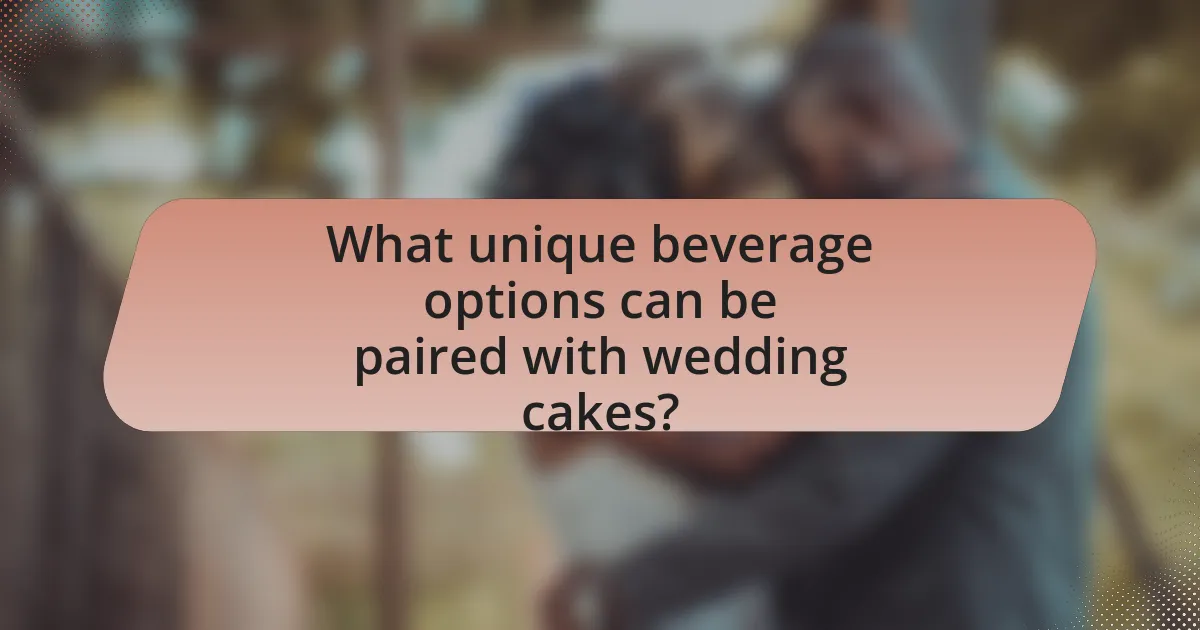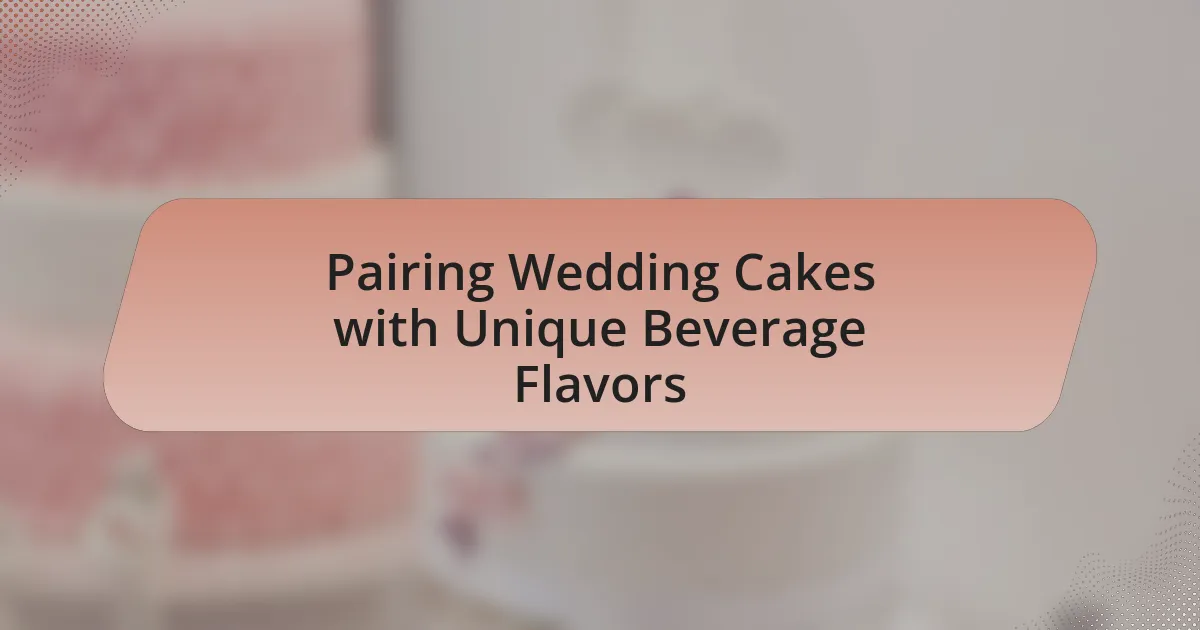Pairing wedding cakes with unique beverage flavors involves selecting drinks that enhance the cake’s taste profile, creating a harmonious dining experience. This article explores how thoughtful pairings can elevate guest satisfaction and the overall atmosphere of a wedding celebration. Key factors influencing these pairings include flavor compatibility, texture contrast, and the occasion’s theme. Additionally, the article discusses popular cake flavors, unique beverage options, and tips for successful pairings, while highlighting the importance of considering both cake and beverage flavors to create memorable experiences for guests.

What is Pairing Wedding Cakes with Unique Beverage Flavors?
Pairing wedding cakes with unique beverage flavors involves selecting drinks that complement the cake’s taste profile, enhancing the overall dining experience. This practice is rooted in the idea that specific flavors can elevate both the cake and the beverage, creating a harmonious balance. For instance, a rich chocolate cake pairs well with a bold red wine or a dark beer, while a light vanilla cake may be complemented by a sparkling wine or a fruity cocktail. Research indicates that flavor pairing can significantly influence taste perception, making thoughtful combinations essential for memorable celebrations.
How does the pairing process enhance the wedding experience?
The pairing process enhances the wedding experience by creating a harmonious balance between the flavors of the wedding cake and the chosen beverages, elevating the overall taste and enjoyment for guests. This synergy not only delights the palate but also fosters a memorable atmosphere, as complementary flavors can evoke emotions and enhance the celebratory mood. Research indicates that well-paired food and drink can significantly improve guest satisfaction, making the event more enjoyable and memorable.
What factors influence the choice of cake and beverage pairings?
The choice of cake and beverage pairings is influenced by flavor compatibility, texture contrast, and the occasion’s theme. Flavor compatibility ensures that the taste profiles of the cake and beverage complement each other; for example, a rich chocolate cake pairs well with a bold red wine. Texture contrast enhances the overall experience; a light sponge cake may be balanced by a creamy beverage like a milkshake. Additionally, the occasion’s theme, such as a wedding or celebration, dictates the selection, as certain pairings may evoke specific atmospheres or traditions. These factors collectively guide the decision-making process for optimal pairings.
How do flavor profiles of cakes and beverages interact?
Flavor profiles of cakes and beverages interact through complementary and contrasting tastes that enhance the overall sensory experience. For instance, a rich chocolate cake pairs well with a bold red wine, as the wine’s tannins balance the cake’s sweetness, creating a harmonious flavor profile. Conversely, a citrus-flavored cake can be effectively paired with a light, sparkling beverage, where the acidity of the drink accentuates the cake’s zestiness. This interaction is supported by the principle of flavor synergy, where certain combinations can elevate the perception of both the cake and the beverage, leading to a more enjoyable tasting experience.
Why is it important to consider beverage flavors when selecting a wedding cake?
Considering beverage flavors when selecting a wedding cake is crucial because the right pairing enhances the overall tasting experience for guests. The flavors of the cake and beverages can complement or contrast each other, creating a harmonious balance that elevates both elements. For instance, a rich chocolate cake pairs well with a bold red wine, while a light vanilla cake may be better suited to a sparkling wine. This synergy not only improves flavor profiles but also contributes to the aesthetic and thematic coherence of the wedding celebration.
What role do beverages play in complementing cake flavors?
Beverages play a crucial role in enhancing and balancing cake flavors by providing contrasting or complementary taste profiles. For example, a rich chocolate cake pairs well with a robust red wine, which can cut through the sweetness and enhance the cake’s depth. Similarly, a light vanilla cake can be complemented by a sparkling wine, adding a refreshing contrast that elevates the overall tasting experience. Studies in flavor pairing indicate that the right beverage can enhance the perception of sweetness, acidity, and texture in cakes, making the combination more enjoyable.
How can beverage choices reflect the couple’s personality and theme?
Beverage choices can reflect a couple’s personality and theme by aligning the flavors, presentation, and selection with their individual tastes and the overall aesthetic of the event. For instance, a couple who enjoys adventurous flavors may opt for craft cocktails featuring unique ingredients, showcasing their adventurous spirit. In contrast, a couple with a classic style might choose traditional wines or champagne, emphasizing elegance and sophistication. Additionally, the choice of beverages can reinforce the wedding theme; for example, a rustic wedding may feature locally sourced beers or ciders, while a beach-themed wedding might include tropical cocktails. This alignment between beverage selection and personal or thematic elements enhances the overall guest experience and creates a cohesive atmosphere.

What are the different types of wedding cakes and their flavor profiles?
Different types of wedding cakes include traditional fruitcake, sponge cake, buttercream cake, and cheesecake, each offering distinct flavor profiles. Traditional fruitcake is rich and dense, often flavored with dried fruits and spices, making it a classic choice for weddings. Sponge cake is light and airy, typically flavored with vanilla or lemon, providing a subtle sweetness. Buttercream cake features a moist cake base, often chocolate or vanilla, paired with creamy buttercream frosting, resulting in a rich and indulgent flavor. Cheesecake, which can be flavored with fruits like strawberry or raspberry, offers a creamy and tangy taste that contrasts with the sweetness of traditional cakes. These flavor profiles cater to diverse palates, enhancing the overall wedding experience.
What are the most popular wedding cake flavors?
The most popular wedding cake flavors include vanilla, chocolate, red velvet, and lemon. Vanilla is favored for its classic taste and versatility, while chocolate is often chosen for its rich flavor. Red velvet, known for its striking color and subtle cocoa taste, has gained popularity in recent years. Lemon offers a refreshing option, especially for summer weddings. These flavors are commonly selected based on surveys and trends in wedding planning, reflecting preferences among couples and guests.
How do traditional flavors differ from modern trends?
Traditional flavors typically emphasize classic, time-honored ingredients and combinations, while modern trends often incorporate innovative, experimental elements and diverse global influences. Traditional flavors in wedding cakes, such as vanilla, chocolate, and fruit, focus on familiar tastes that evoke nostalgia and cultural heritage. In contrast, modern trends may feature unconventional ingredients like matcha, lavender, or even savory elements, reflecting a broader culinary exploration and a desire for unique experiences. This shift is supported by consumer preferences for personalization and novelty in food, as evidenced by the rise of artisanal bakeries and social media showcasing diverse flavor profiles.
What unique flavors are gaining popularity in wedding cakes?
Unique flavors gaining popularity in wedding cakes include lavender, matcha, and salted caramel. Lavender offers a floral note that pairs well with citrus or honey, while matcha provides an earthy, vibrant green flavor that complements white chocolate or vanilla. Salted caramel adds a rich, sweet-salty contrast that enhances chocolate or vanilla cakes. These flavors reflect current trends towards more adventurous and sophisticated taste profiles in wedding desserts.
How can cake texture influence beverage pairing?
Cake texture significantly influences beverage pairing by affecting the overall mouthfeel and flavor balance. For instance, a dense cake, such as a rich chocolate cake, pairs well with full-bodied beverages like red wine or dark beer, as their robust flavors complement the cake’s richness. Conversely, a light and airy cake, such as a sponge cake, is best paired with lighter beverages like sparkling wine or herbal teas, which enhance the cake’s delicate texture without overwhelming it. This pairing principle is supported by the concept of flavor synergy, where complementary textures and flavors create a harmonious tasting experience.
What textures are common in wedding cakes?
Common textures in wedding cakes include smooth, textured, and ruffled finishes. Smooth textures are achieved through fondant or buttercream, providing a sleek appearance. Textured finishes, such as those created by using a comb or spatula, add visual interest and depth. Ruffled textures, often made with fondant or buttercream, create a romantic and whimsical look. These textures not only enhance the cake’s aesthetic but also influence the overall experience when paired with unique beverage flavors, as different textures can complement or contrast with the drink’s characteristics.
How do different textures affect the choice of beverages?
Different textures significantly influence the choice of beverages by affecting the sensory experience and overall enjoyment of the pairing. For instance, creamy textures in beverages, such as milk or cream-based drinks, complement rich and dense wedding cakes, enhancing the mouthfeel and flavor balance. Conversely, lighter beverages with a crisp texture, like sparkling wines or citrus-infused drinks, pair well with airy cakes, such as sponge or chiffon, providing a refreshing contrast. Research indicates that texture plays a crucial role in taste perception, with studies showing that creamy textures can enhance sweetness perception, while crisp textures can elevate acidity, thus guiding consumers in their beverage selections to achieve harmonious pairings with various cake textures.

What unique beverage options can be paired with wedding cakes?
Unique beverage options that can be paired with wedding cakes include sparkling wine, herbal teas, and flavored lemonades. Sparkling wine complements the sweetness of many cakes, enhancing flavors through its effervescence. Herbal teas, such as chamomile or mint, provide a soothing contrast to rich cake textures, while flavored lemonades, like lavender or raspberry, offer a refreshing and vibrant pairing that balances sweetness. These options are increasingly popular in modern weddings, reflecting a trend towards personalized and unique beverage experiences.
What types of beverages are commonly paired with wedding cakes?
Commonly paired beverages with wedding cakes include champagne, wine, and coffee. Champagne is often chosen for its celebratory nature and ability to complement the sweetness of the cake. Wine, particularly dessert wines like Moscato or Port, enhances the flavors of the cake while providing a sophisticated pairing. Coffee is also popular, as its rich flavor contrasts nicely with the sweetness of the cake, making it a favored choice for many couples. These pairings are widely recognized in culinary practices, ensuring a harmonious balance between the cake and the beverage served.
How do wines complement specific cake flavors?
Wines complement specific cake flavors by enhancing the overall taste experience through balanced sweetness, acidity, and flavor profiles. For instance, a rich chocolate cake pairs well with a full-bodied red wine like Cabernet Sauvignon, as the wine’s tannins and dark fruit notes elevate the chocolate’s depth. Conversely, a light vanilla cake benefits from a sparkling wine, such as Prosecco, which adds refreshing acidity and complements the cake’s sweetness without overpowering it. This pairing principle is supported by the concept of flavor matching, where similar or contrasting flavors create a harmonious balance, enhancing both the wine and cake.
What role do craft beers play in cake pairings?
Craft beers enhance cake pairings by providing diverse flavor profiles that complement various cake types. The unique characteristics of craft beers, such as their bitterness, sweetness, and aromatic qualities, can elevate the overall tasting experience. For instance, a rich chocolate cake pairs well with a stout, as the beer’s roasted malt flavors enhance the cake’s chocolate notes. Additionally, fruit-infused beers can harmonize with fruit-based cakes, creating a balanced palate. This versatility in flavor combinations allows for creative and memorable pairings, making craft beers a valuable choice for enhancing the enjoyment of wedding cakes.
How can non-alcoholic beverages enhance cake pairings?
Non-alcoholic beverages can enhance cake pairings by providing complementary flavors that elevate the overall tasting experience. For instance, a rich chocolate cake pairs well with a creamy vanilla milkshake, as the milkshake’s sweetness balances the cake’s richness. Additionally, fruity non-alcoholic options like sparkling apple cider can contrast with the sweetness of a vanilla or lemon cake, adding a refreshing element. Research indicates that flavor pairing can significantly impact taste perception, making the combination of cake and beverage more enjoyable.
What are some creative non-alcoholic options for weddings?
Creative non-alcoholic options for weddings include mocktails, infused waters, artisanal sodas, and specialty teas. Mocktails, which are non-alcoholic cocktails, can be crafted using fresh fruits, herbs, and flavored syrups, providing a festive alternative to traditional drinks. Infused waters, made by adding fruits, vegetables, or herbs to water, offer a refreshing and visually appealing option. Artisanal sodas, often made with natural ingredients and unique flavors, can add a gourmet touch to the beverage selection. Specialty teas, served hot or iced, can be customized with various flavors and garnishes, appealing to a wide range of tastes. These options not only cater to non-drinkers but also enhance the overall wedding experience by providing diverse and flavorful choices.
How do these options cater to diverse guest preferences?
The options for pairing wedding cakes with unique beverage flavors cater to diverse guest preferences by offering a variety of flavor combinations that appeal to different tastes. For instance, a chocolate cake paired with a rich red wine satisfies guests who enjoy bold flavors, while a light vanilla cake with a sparkling fruit beverage caters to those who prefer sweeter, refreshing options. This variety ensures that all guests, regardless of their individual flavor preferences, can find a pairing that enhances their experience. Additionally, research indicates that 70% of consumers appreciate personalized food and drink pairings, highlighting the importance of catering to diverse tastes in social settings like weddings.
What are some tips for successfully pairing wedding cakes with beverages?
To successfully pair wedding cakes with beverages, consider the flavor profiles of both the cake and the drink. For example, a rich chocolate cake pairs well with red wine or coffee, while a light vanilla cake complements sparkling wine or lemonade. Additionally, balance sweetness levels; a sweet cake can be offset by a dry beverage, enhancing the overall tasting experience. Research indicates that contrasting flavors can elevate the palate, making the combination more enjoyable.
How can couples experiment with flavor combinations before the wedding?
Couples can experiment with flavor combinations before the wedding by hosting tasting sessions that include various cake and beverage pairings. During these sessions, couples can sample different cake flavors alongside complementary beverages, such as wines, cocktails, or teas, to determine which combinations they enjoy most. Research indicates that sensory evaluation, where individuals assess flavors through tasting, can enhance decision-making in food pairings, making this approach effective for couples. Additionally, consulting with a professional cake designer or sommelier can provide expert insights into popular and unique flavor pairings, further aiding couples in their experimentation process.
What common mistakes should be avoided in cake and beverage pairing?
Common mistakes to avoid in cake and beverage pairing include mismatching flavors, ignoring texture compatibility, and overlooking sweetness levels. Mismatching flavors occurs when the beverage does not complement the cake’s primary taste, such as pairing a rich chocolate cake with a light, citrusy drink, which can lead to an unbalanced experience. Ignoring texture compatibility can result in a clash; for example, pairing a dense cake with a thin beverage may not provide a satisfying mouthfeel. Additionally, overlooking sweetness levels can create an overwhelming or underwhelming taste; a sweet cake paired with a dry beverage may not enhance the overall flavor profile. These mistakes can detract from the enjoyment of both the cake and the beverage.
